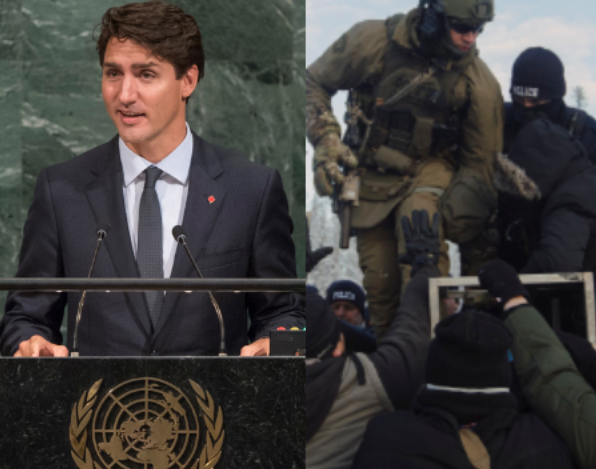If the Canadian government continues to enable the criminalization of Indigenous land defenders opposed to fossil fuel megaprojects, it will continue to miss the carbon emission reduction targets it has pledged at United Nations climate summits.
Under the Harper and Trudeau governments, Canada has previously promised to cut emissions by 30 per cent below 2005 levels by 2030. At the Leaders’ Summit on Climate in April of this year, Trudeau announced that Canada had set a more ambitious emissions reduction target of 40-45 per cent below 2005 levels by 2030.
Given Canada’s emissions were 731 megatons in 2005, a 30 per cent reduction would have meant a 2030 target of 512 megatons. The new 40-45 per cent reduction target sets a goal of 402-438 megatons.
In 2016, the year following the Paris Agreement, Canada’s emissions were 707 megatons. In 2019, the most recent year that data is available, that rose to 730 megatons. Furthermore, Environment Canada projected in 2017 that Canada would emit between 697 and 790 megatons in 2030.
Despite these lacklustre numbers, the Canadian government insists it’s “on track to exceed the Paris targets.”
Land defenders criminalized
As carbon emissions increase, Indigenous land defenders opposed to fossil fuel megaprojects have continued to be criminalized despite the commitments made at the COP21 summit in Paris in December 2015.
The Line 3 and Trans Mountain tar sands pipelines and the Coastal GasLink fracked gas pipeline could generate 430 megatons of carbon pollution annually.
The Trudeau government approved the Line 3 export pipeline in November 2016, less than a year after COP21. More than 800 water protectors were arrested in Minnesota this past year resisting this pipeline. They were arrested by police funded by Calgary-based Enbridge, the company building the pipeline.
Secwepemc land defender Kanahus Manuel and others have been arrested on their territory opposing the ongoing construction of the Trans Mountain pipeline bought by the Trudeau government in May 2018.
And two highly militarized raids on Wet’suwet’en territory resulted in the arrest of 36 land defenders (14 in 2019, 22 in 2020) opposed to the Coastal GasLink pipeline. Another RCMP raid is expected within weeks.
Criminalized Indigenous resistance to extractive megaprojects has been crucial in upholding the promise of the Paris Agreement.
The Indigenous Environmental Network and Oil Change International recently calculated that: “Indigenous resistance has stopped or delayed greenhouse gas pollution equivalent to at least one-quarter of annual U.S. and Canadian emissions.”
That’s more than any COP summit has been able to achieve.
Furthermore, the Human Rights Council passed this resolution in 2019 that affirms defenders “must be ensured a safe and enabling environment to undertake their work free from hindrance and insecurity, in recognition of their important role in supporting States to fulfil their obligations under the Paris Agreement.”
Commenting on the upcoming COP26 talks, cabinet minister Dominic LeBlanc says: “We, frankly, would welcome ideas from international partners and others as to how we can be the most constructive international player possible in these conversations.”
Prime Minister Justin Trudeau is expected to arrive in Glasgow, Scotland for the COP26 summit around November 1.
One constructive – and essential – step to success at COP26 would be for him to stop the criminalization of frontline land defenders and water protectors opposed to the extractive megaprojects that are accelerating the climate crisis.
Brent Patterson is the executive director of Peace Brigades International-Canada. You can follow them on Twitter at @PBIcanada.



